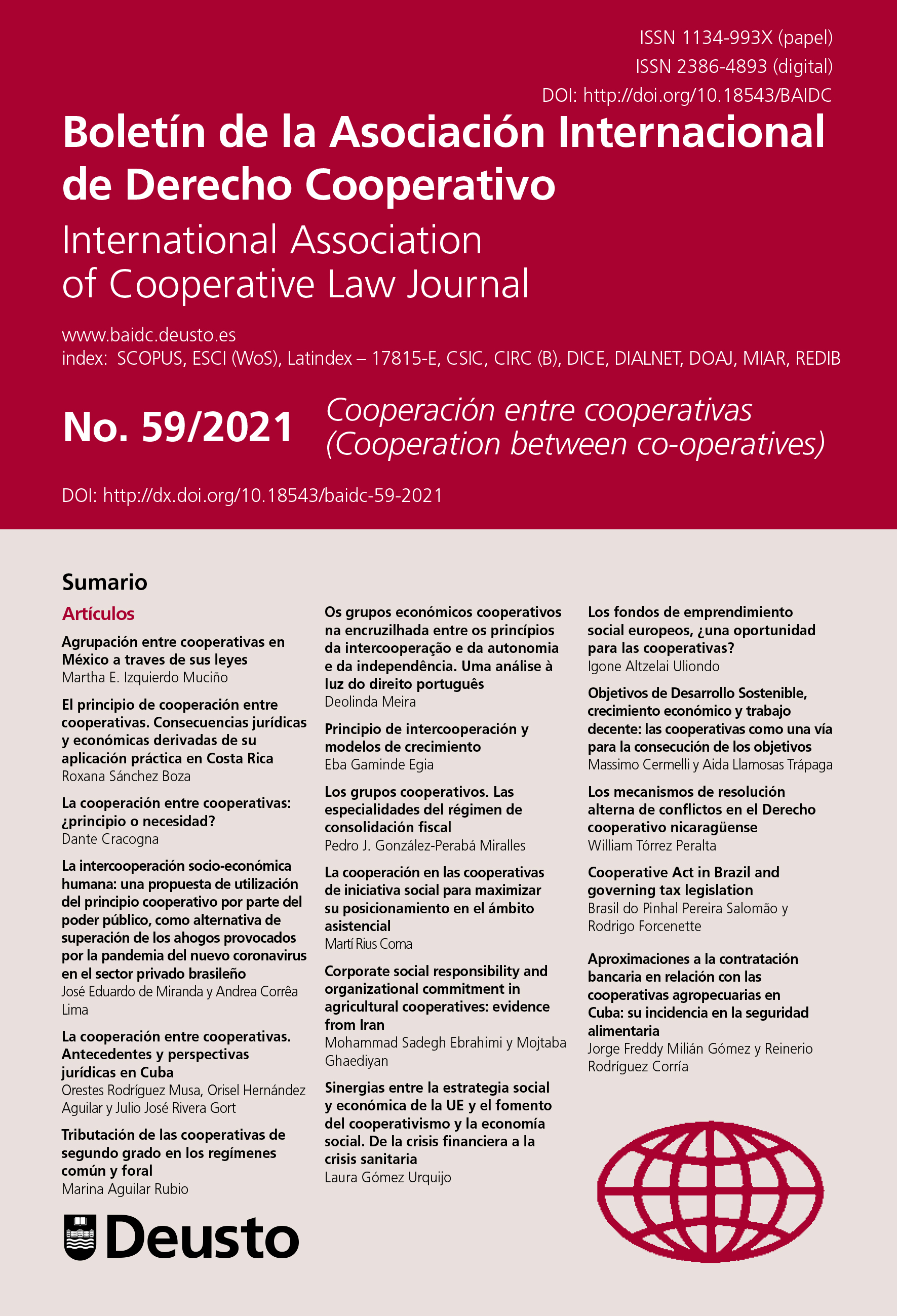Responsabilidad social corporativa y compromiso organizacional en cooperativas agrícolas: evidencias de Irán
Resumen
El propósito de este documento es investigar la responsabilidad social empresarial (RSE) y el compromiso organizacional (CO) en las cooperativas agrícolas de Irán. El modelo de investigación del estudio se prueba a través de una encuesta que consultó a 260 encuestados. El método de recolección de datos es utilizar el cuestionario estándar de responsabilidad social empresarial (RSE) basado en el modelo Carol y compromiso organizacional (OC) basado en el modelo Allen-Meyer. La validez de los datos fue confirmada por la prueba de Bartlett y el coeficiente KMO y su confiabilidad fue confirmada por el alfa de Cronbach. La población estadística de este estudio fueron las cooperativas agrícolas administradas por la Organización Cooperativa Rural (RCO) de la provincia de Isfahan en Irán. Los resultados de esta investigación mostraron que, desde el punto de vista de los miembros, la mayor responsabilidad social empresarial se encontraba en la dimensión legal y la menor en la dimensión discrecional según el modelo Carol. Los resultados de la investigación muestran que el índice de compromiso organizacional de los gerentes es casi del 50%. Los resultados del análisis de cluster en el campo de la percepción de los miembros de la responsabilidad social cooperativa mostraron que las cuatro variables tales como: satisfacción de desempeño, participación de los miembros en reuniones cooperativas, edad y propósito de la membresía, predice el comportamiento de los miembros al separar la cooperativa en dos grupos con RSE fuerte y débil. Asimismo, el resultado del análisis de cluster en el compromiso organizacional de la junta directiva mostró que las variables como: nivel de educación, experiencia gerencial y creencia en la no interferencia de otras instituciones en la gestión cooperativa, predice el comportamiento de compromiso organizacional de la junta directiva en la separación en dos, fuertes y débiles el OC.
Received: 29 December 2020
Accepted: 23 September 2021
Descargas
Citas
Ademilua, V.A., Sule, L.A and Adeyeye, A. 2017. “Cooperative Societies and Corporate Social Responsibilities (CSR) Opportunities for Rural Developments in Africa”. Journal of Culture, Society and Development. 30: 10-14.
Aref, F. 2011. “Agricultural Cooperatives for Agricultural Development in Iran”. Life Science Journal. 8: 82-85.
Barraud-Didier, V., Henninger, M. and El Akremi, A. 2012. “The Relationship Between Members’ Trust and Participation in the Governance of Cooperatives: The Role of Organizational Commitment”. International Food and Agribusiness Management Review 15(1):1-24.
Bortoleto, F., Rogério, D and Costa, D. 2012. “The Importance of Cooperatives’ Corporate Social Responsibility to the Loyalty of Members”. Journal of Rural Co-operation. 40. 198-216.
Boudlaie, H., Boghosian, A and Panjali, H.M. 2018. The impact of corporate social responsibility and internal marketing on employee turnover intentions with the mediating role of organizational commitment, 15(4): 29-44.
Buang, Mokhtaruddin, y Asnarulkhadi Abu Samah. 2020. «Systematic review of factors influencing the effectiveness of the co-operative board». REVESCO. Revista de Estudios Cooperativos 136, n.º noviembre: e71855. https://doi.org/10.5209/reve.71855
Cechin, A., Bijman, J., Pascucci, S., and Omta, O. 2013. “Decomposing the Member Relationship in Agricultural Cooperatives: Implications for Commitment”. Agribusiness, 29(1), 39-61. doi: https://doi.org/10.1002/agr.21321.
Collins, S. 2010. “Corporate Social Responsibility and the Future Healthcare Manager”. The Health Care Manager 29( 4): 339-345. doi: https://doi.org/10.1097/HCM.0b013e3181fa050e.
Colom Gorgues, Antonio, Pilar Cos Sánchez, and Rosa M. Florensa Guiu. 2019. “Agri-food cooperatives in Europe. Dimension, governance and BCG analysis of cooperative societies TOP25 of the EU-28 and TOP10 in Spain”. REVESCO. Revista de Estudios Cooperativos 130, n.º March: 73-98. https://doi.org/10.5209/REVE.62811
Cooper-Hakim, A and Chockalingam V. 2005. “The construct of work commitment: testing an integrative framework”. Psychological Bulletin 131(2): 241-259.
Galbreath, J. 2009. “Building corporate social responsibility into strategy”, European Business Review, Vol. 21 No. 2, pp. 109-127. https://doi.org/10.1108/09555340910940123
Galbreath, J. 2006. “Corporate social responsibility strategy: Strategic options, global considerations”. Corporate Governance: The international journal of business in society. 6. https://doi.org/10.1108/14720700610655178.
Gharleghi, B., Afshar Jahanshahi , A and Nawaser, K. 2018. “The Outcomes of Corporate Social Responsibility to Employees: Empirical Evidence from a Developing Country”. Sustainability, 10, 698.
Grashus, J and Su, Y. 2018. “A review of the empirical literature on farmer cooperatives: performance, owenership and governance, finance and member attitude”. Annals of Public and Cooperative Economics, 12(4): 77-102.
Hao, J. 2015. “Cooperative member commitment, trust and social pressure - the role of members’ participation in the decision-making”. 30th international conference of agricultural economists, July 28- August 2, Vancover, Canada.
Hasan, Ishak, A. Azhari, and M. Shabri Abd. Majid. 2018. “How efficient and productive are co-operatives in Indonesia? Empirical evidence from data envelopment analysis”. REVESCO. Revista de Estudios Cooperativos 128, n.º June: 149-72. https://doi.org/10.5209/REVE.60208
ICA. 2016. Sustainability Reporting for Co-operatives: A Guidebook, International Cooperative Alliance, March, p.32.
Imran, A., Kashif Ur, R., Syed Irshad, A., Jamil, Y. and Maria, Z. 2010. “Corporate social responsibility influences, employee commitment and organizational performance”. African Journal of Business Management. 4(12): 2796-2801.
Jamali, D and Mirshak, R. 2007. “Corporate social responsibility (CSR): Theory and practice in a developing country context”. Journal of Business Ethics,72:243-262.
Jussila, I., Goel, S and Tuominen, H. 2012. “Member commitment in co-operatives: The utilitarian approach”. Business and Management Research, 1(3), 9.
Kim,J. Song, H.J and Lee, C.K. 2016. “Effects of corporate social responsibility and internal marketing on organizational commitment and turnover intentions”. International Journal of Hospitality Management, N. 55, PP. 25–3.
Maignan, I., Ferrell, O.C and Hult, T. 1999. “Corporate citizenship: Cultural antecedents and business benefits”. Journal of the Academy of Marketing Science 27(4): 455-469.
Mattila, M. 2009. “Corporate social responsibility and image in organizations: for the insiders or the outsiders?” Social Responsibility Journal, 5(4), 540–549.
Meyer, J.P and Herscovitch, L. 2001. “Commitment in the workplace: Towards a general model”. Human Resource Management Review 11: 299-326.
Meyer, J. P and Parfyonova, N. M. 2010. “Normative commitment in the workplace: A theoretical analysis and re-conceptualization”. Human resource management review, 20(4), 283-294.
Meyer, J. P., Becker, T. E and Van Dick, R. 2006. “Social identities and commitments at work: Toward an integrative model”. Journal of organizational behavior, 27(5), 665-683.
Meyer, J. P., Stanley, D. J., Herscovitch, L and Topolnytsky, L. 2002. “Affective, continuance, and normative commitment to the organization: A metanalysis of antecedents, correlates, and consequences”. Journal of vocational behavior, 61(1), 20-52.
Mory, L., Wirtz, B and Göttel, V. 2016. “Corporate social responsibility strategies and their impact on employees’ commitment”. Journal of Strategy and Management. 9. 172-201. https://doi.org/10.1108/JSMA-12-2014-0097.
Nguyen, N.T and Yves, F. 2017. “The Impact of Internal Corporate Social Responsibility on Organizational Commitment: Evidence from Vietnamese Service Firms”. Journal of Asia-Pacific Business, 18:2, 100-116, DOI: https://doi.org/10.1080/10599231.2017.1309617
Noruzi, M. R and Westover, J. H. 2010. “Opportunities, Challenges and Employment Relative Advantages in the Cooperative Sector in Iran”. Management Science and Engineering, 4(3): 10-18.
Nunes, Francisco G., Luis Manuel Dias Martins, y Albino Lopes. 2020. «Promoting the effectiveness of Social Economy Organisations: a proposal based on identity management». REVESCO. Revista de Estudios Cooperativos 135, n.º mayo: e69180. https://doi.org/10.5209/reve.69180
Pavie, J.J.E. 2008. Responsabilidade social corporativa e desempenho financeiro: uma meta-análise. Master’s Thesis. Faculdades IBMEC.
Peng, J.C and Su-Fen, C. 2010. “An integrative model linking feedback environment and organizational citizenship behavior”. The Journal of Social Psychology 150(6): 582-607.
Pomering, A and Johnson, L. 2009. “Advertising corporate social responsibility initiatives to communicate corporate image: Inhibiting skepticism to enhance persuasion”. Corporate Communications: An International Journal, 14, 420-439.
Rabiey, M.R and Gholami, M. 2016. “Impact of social responsibility of organizational commitment”. Journal of education administration research, 7(3): 69-98.
Rezaiean, A., Givi H.E and Nasrabadi, M.B. 2010. “The relationship between organizational justice and organizational citizenship behaviors: the mediating role of organizational commitment, satisfaction and trust”. Research Journal of Business Management 4(2): 112-120.
Solinger, O. N., Van Olffen, W., and Roe, R. A. 2008. “Beyond the three-component model of organizational commitment”. Journal of applied psychology, 93(1), 70.
Sousa Silva, Lindomar De Jesus de, José Olenilson Costa Pinheiro, Endrio Morais dos Santos, Jemima Ismael da Costa, y Gilmar Antonio Meneghetti. 2019. «O cooperativismo como instrumento para a autonomia de comunidades rurais da Amazônia: a experiência dos agricultores extrativistas do municipio de Lábrea, AM». Boletín de la Asociación Internacional de Derecho Cooperativo, n.º 55 (diciembre), 199-226. https://doi.org/10.18543/baidc-55-2019pp199-226.
Turker, D. 2009. “Measuring Corporate Social Responsibility: A Scale Development Study”. J Bus Ethics. 85, 411–427.
World Co-operative Monitor. 2017. Exploring the Co-operative economy, Eurisce – ICA.
Zukauskas, P., Vveinhardt, J. and Andriukaitienė, R. 2018. Corporate Social Responsibility as the Organization’s Commitment against Stakeholders. https://doi.org/10.5772/intechopen.70625.
Derechos de autor 2021 Universidad de Deusto

Esta obra está bajo licencia internacional Creative Commons Reconocimiento-NoComercial 4.0.
El/la autor/a, mediante la entrega de sus manuscritos al Boletín de la Asociación Internacional de Derecho Cooperativo (BAIDC), acepta las condiciones que se detallan a continuación sobre derechos de autor/a y se compromete a cumplirlas.
1. Cesión de derechos
La Editorial (Universidad de Deusto) conserva los derechos de autor/a de esta publicación.
Mediante la entrega de sus manuscritos al Boletín de la Asociación Internacional de Derecho Cooperativo (BAIDC), sin la firma de ningún documento de cesión, el/la autor/a cede libre de pago a la Editorial (Universidad de Deusto) los derechos de distribución, comunicación pública y reproducción del trabajo que somete a publicación en el Boletín de la Asociación Internacional de Derecho Cooperativo (BAIDC) en cualquier tipo de soporte, ahora conocidos o desarrollados en el futuro, para los propósitos educativos y académicos incluida la cesión para su inclusión en las bases de datos en las que esta revista está indexada.
2. Autoría
El/la autor/a debe ser el/la único/a creador/a de la obra o debe actuar legalmente en nombre y con el pleno acuerdo de todos/as los/as co-autores/as.
Los/as autores/as deberán asegurarse en su caso de que todos los/as coautores/as estén debidamente incluidos, y que no haya ninguna persona mencionada como autora indebidamente. Igualmente, todos/as los/as autores/as deberán haber visto y aprobado la versión final del trabajo y su envío para su publicación.
Para evitar el riesgo de autoría ficticia o usurpada, se recomienda que, en el momento de enviar el documento, todas las autorías se pongan de acuerdo en sus aportaciones y en el orden en que aparecerán en la lista de coautores/as.
El/la autor/a garantiza que no se han otorgado ni se otorgarán permisos o licencias de cualquier tipo que puedan violar los derechos otorgados a la Editorial (Universidad de Deusto).
El/la autor/a asume la responsabilidad de obtener todos los permisos necesarios para la reproducción en sus manuscritos de cualquier texto, material o ilustración, proveniente de otro/a autor/a, institución o publicación.
3. Derecho de autor/a y Código de conducta
El/la autor/a garantiza que su trabajo es original; que no ha sido publicado en cualquier forma anteriormente; que no está preparando su publicación en otra parte; que su envío y publicación no violan las directrices éticas de la Revista (BAIDC) ni los códigos de conducta, leyes o derechos de cualquier tercero.
4. Difusión en régimen de Acceso Abierto (Open Access)
El acceso al contenido digital de cualquier número del Boletín de la Asociación Internacional de Derecho Cooperativo (BAIDC) es gratuito, en régimen de Acceso Abierto (Open Access). Los trabajos podrán leerse, descargarse, copiar y difundir, sin fines comerciales inmediatamente después de su publicación, sin la previa autorización del editor o el autor, siempre que la obra original sea debidamente citada y cualquier cambio en el original esté claramente indicado.
5. Redifusión del artículo por el/la autor/a
El/la autor/a tiene el derecho a presentar, exhibir, distribuir, desarrollar y publicar su trabajo, siempre que indique con claridad y en la primera nota a pie de página que el trabajo se publicó por primera vez en el Boletín de la Asociación Internacional de Derecho Cooperativo, con indicación del número, año, páginas y DOI (si procede).
Aviso legal
Cualquier uso del artículo contrario a las reglas anteriores en cualquier medio o formato, ahora conocido o desarrollado en el futuro, requiere el permiso previo por escrito del titular de los derechos de autor/a.
Las consecuencias que puedan derivarse de denuncias por publicación de artículos plagiados serán responsabilidad exclusiva del/de la autor/a.


.jpg)
.jpg)
.jpg)
.jpg)
.jpg)
.jpg)






